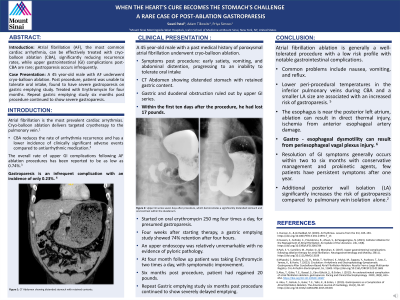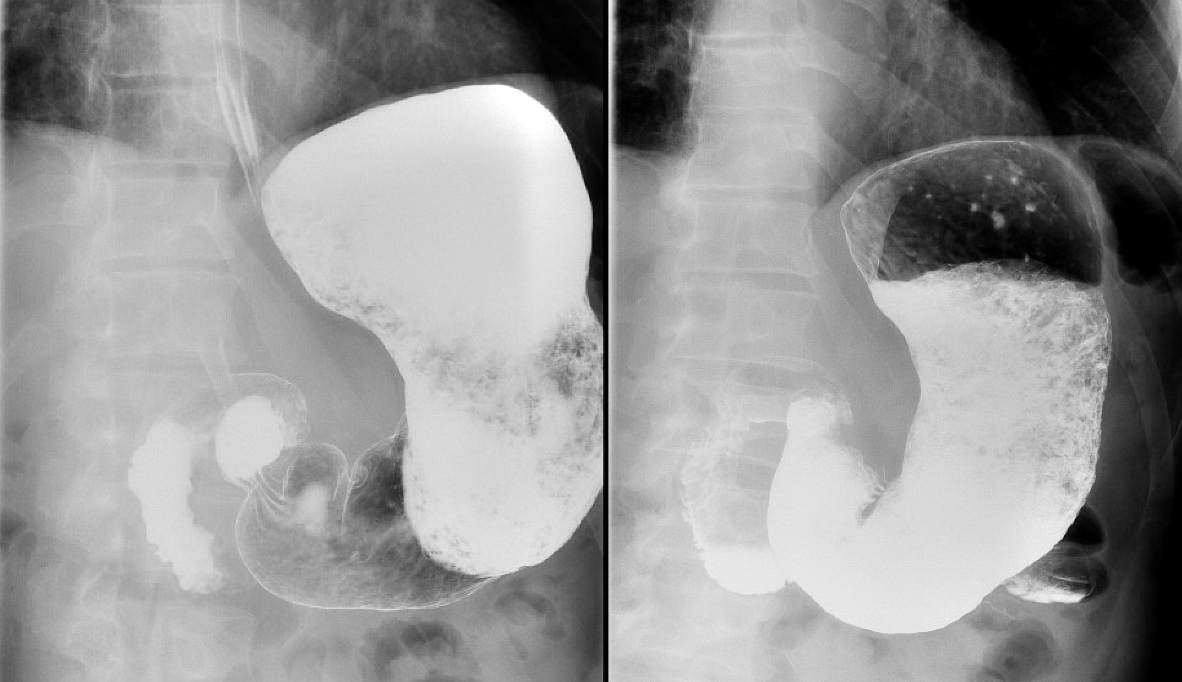Monday Poster Session
Category: Functional Bowel Disease
P2365 - When the Heart's Cure Becomes the Stomach's Challenge: A Rare Case of Post Cryoballon Ablation Gastroparesis
Monday, October 28, 2024
10:30 AM - 4:00 PM ET
Location: Exhibit Hall E

Has Audio
.jpg)
Swati Patel, MD
Mount Sinai Morningside/West, Icahn School of Medicine at Mount Sinai
New York, NY
Presenting Author(s)
Swati Patel, MD1, Adam Tillowitz, MD2, Priya Simoes, MD3
1Mount Sinai Morningside/West, Icahn School of Medicine at Mount Sinai, New York, NY; 2Icahn School of Medicine at Mount Sinai Morningside/West, New York, NY; 3Mount Sinai Morningside, Icahn School of Medicine at Mount Sinai, New York, NY
Introduction: Atrial fibrillation (AF) is the most prevalent cardiac arrythmias. Multiple studies have demonstrated that cryo-balloon ablation (CBA), which delivers targeted cryotherapy to the pulmonary vein, successfully treats AF, reduces the rate of arrhythmia recurrence, and has a lower incidence of adverse events when compared to antiarrhythmic medication.The rate of upper gastrointestinal (GI) complications following AF ablation procedures is reported to be as low as 0.74%, gastroparesis (GP) being an especially infrequent complication with an incidence of only 0.2%.
Case Description/Methods: A 45-year-old male with a past medical history of paroxysmal AF underwent CBA. The following day, he began experiencing early satiety, vomiting, and abdominal distention, which progressed to an inability to tolerate any oral intake and was admitted to the hospital. Within 10 days, the patient had lost 17 pounds(lbs). An upper GI series done seven days after the procedure showed no evidence of gastric or duodenal obstruction, but there was significant distention of the stomach with a large amount of retained contents. He was started on oral erythromycin 250mg four times a day, for presumed GP with some improvement in his symptoms. Four weeks after starting erythromycin therapy, a gastric emptying study showed 74% retention after four hours. Two months post-ablation, the patient’s vomiting had resolved, and he had regained 8 lbs, however he continued to experience nausea and early satiety. A upper endoscopy was relatively unremarkable with no evidence of pyloric pathology. Six months post procedure, patient had regained 20 lbs. Gastric emptying study six months post procedure continued to show severely delayed emptying.
Discussion: AF ablation is a well-tolerated procedure with a low risk profile but may cause significant GI complications. Common problems include nausea, vomiting, and gastroesophageal reflux. Serious complications include esophageal injury and GP. Lower periprocedural temperatures in the inferior pulmonary veins during CBA and a smaller left atrium size are associated with an increased risk of GP. Given that the esophagus is near the posterior left atrium, endocardial ablation can cause direct thermal injury to the esophagus, ischemia from anterior esophageal artery damage, and esophageal dysmotility from peri-esophageal vagal plexus injury. GI symptoms generally resolve within two to six months with conservative management and prokinetic agents, rarely (four patients) symptoms persist over one year.

Note: The table for this abstract can be viewed in the ePoster Gallery section of the ACG 2024 ePoster Site or in The American Journal of Gastroenterology's abstract supplement issue, both of which will be available starting October 27, 2024.
Disclosures:
Swati Patel, MD1, Adam Tillowitz, MD2, Priya Simoes, MD3. P2365 - When the Heart's Cure Becomes the Stomach's Challenge: A Rare Case of Post Cryoballon Ablation Gastroparesis, ACG 2024 Annual Scientific Meeting Abstracts. Philadelphia, PA: American College of Gastroenterology.
1Mount Sinai Morningside/West, Icahn School of Medicine at Mount Sinai, New York, NY; 2Icahn School of Medicine at Mount Sinai Morningside/West, New York, NY; 3Mount Sinai Morningside, Icahn School of Medicine at Mount Sinai, New York, NY
Introduction: Atrial fibrillation (AF) is the most prevalent cardiac arrythmias. Multiple studies have demonstrated that cryo-balloon ablation (CBA), which delivers targeted cryotherapy to the pulmonary vein, successfully treats AF, reduces the rate of arrhythmia recurrence, and has a lower incidence of adverse events when compared to antiarrhythmic medication.The rate of upper gastrointestinal (GI) complications following AF ablation procedures is reported to be as low as 0.74%, gastroparesis (GP) being an especially infrequent complication with an incidence of only 0.2%.
Case Description/Methods: A 45-year-old male with a past medical history of paroxysmal AF underwent CBA. The following day, he began experiencing early satiety, vomiting, and abdominal distention, which progressed to an inability to tolerate any oral intake and was admitted to the hospital. Within 10 days, the patient had lost 17 pounds(lbs). An upper GI series done seven days after the procedure showed no evidence of gastric or duodenal obstruction, but there was significant distention of the stomach with a large amount of retained contents. He was started on oral erythromycin 250mg four times a day, for presumed GP with some improvement in his symptoms. Four weeks after starting erythromycin therapy, a gastric emptying study showed 74% retention after four hours. Two months post-ablation, the patient’s vomiting had resolved, and he had regained 8 lbs, however he continued to experience nausea and early satiety. A upper endoscopy was relatively unremarkable with no evidence of pyloric pathology. Six months post procedure, patient had regained 20 lbs. Gastric emptying study six months post procedure continued to show severely delayed emptying.
Discussion: AF ablation is a well-tolerated procedure with a low risk profile but may cause significant GI complications. Common problems include nausea, vomiting, and gastroesophageal reflux. Serious complications include esophageal injury and GP. Lower periprocedural temperatures in the inferior pulmonary veins during CBA and a smaller left atrium size are associated with an increased risk of GP. Given that the esophagus is near the posterior left atrium, endocardial ablation can cause direct thermal injury to the esophagus, ischemia from anterior esophageal artery damage, and esophageal dysmotility from peri-esophageal vagal plexus injury. GI symptoms generally resolve within two to six months with conservative management and prokinetic agents, rarely (four patients) symptoms persist over one year.

Figure: Figure 1: Upper GI series seven days after procedure, which demonstrates a significantly distended stomach with bezoar.
Note: The table for this abstract can be viewed in the ePoster Gallery section of the ACG 2024 ePoster Site or in The American Journal of Gastroenterology's abstract supplement issue, both of which will be available starting October 27, 2024.
Disclosures:
Swati Patel indicated no relevant financial relationships.
Adam Tillowitz indicated no relevant financial relationships.
Priya Simoes indicated no relevant financial relationships.
Swati Patel, MD1, Adam Tillowitz, MD2, Priya Simoes, MD3. P2365 - When the Heart's Cure Becomes the Stomach's Challenge: A Rare Case of Post Cryoballon Ablation Gastroparesis, ACG 2024 Annual Scientific Meeting Abstracts. Philadelphia, PA: American College of Gastroenterology.
